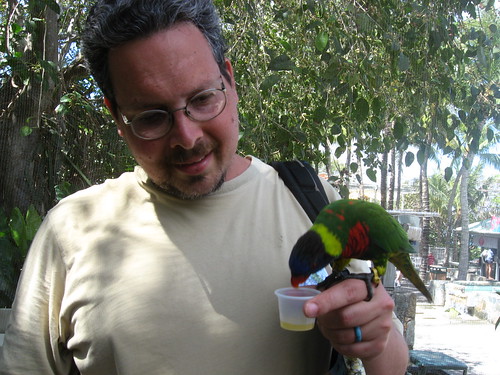|
|
Wednesday, June 10th, 2009
When you considered the dead man's tirade in detail, you thought it vulgar... He had implied that poverty reduced everything to mere stark need, abrogating all but the coarsest emotions. ...You will remember that the dead fisherman (even then puffing through your lungs and coursing in your blood) had not had it entirely his way. Before he faded, you had got a word in, sharp with the triumphalism of the living. ...You informed him that you would use him entirely as you saw fit, together with his compatriots, the scenery, diverting cosmogonies, smells, sounds and words.
There are two books in Seven-Tenths -- the main body of the text is a mix of science writing and memoir, some oceanography and ethnography mixed in with stories of how Hamilton-Paterson came to find out what he's writing about, and some ecological advocacy mixed in with fatalism and worry. There's a lot to it, a lot to think about and some really engaging writing. Set around this -- pretty separate, not really blending in to the main body of the text at all -- is a narrative of a swimmer lost at sea, unable to locate the boat he dived from after the line that was connecting him to it separates. This second narrative was not really grabbing me as I read the book, I couldn't really relate it to the rest of the book. Well at the end of the main text is a note explaining that the swimmer was him -- so clearly he did make it back to the boat -- and talking broadly about what has been lost in the past century. And then, he writes a 60-page essay in the second person about a fantasy of sailing with lobster poachers and discovering a dead body at sea, intertwined with the narrative of a historical (or fictional? I cannot find any reference online that attests to his existence independent of this book) shipwrecked sailor named Giusto Forbici... I am getting impatient, unable to see what all this is adding to the rest of the book. But, well, the final two sections of this essay sort of manage to wrap everything together, to make explicit and foreground some questions and conflicts about Hamilton-Peterson's role as author that have been hinted at throughout the text.
posted evening of June 10th, 2009: 2 responses
➳ More posts about Readings
|  |
Saturday, June 6th, 2009
The hills are shadows, and they flow
From form to form, and nothing stands;
They melt like mist, the solid lands,
Like clouds they shape themselves and go.
I don't have a lot of exposure to Tennyson, somewhere I picked up a vague idea that his poetry would not be worth my spending any time on, and I have not. But I sure like this image: it is from his poem "In Memoriam A.H.H." and James Hamilton-Paterson quotes it at the end of a chapter concerning the sea floor. According to Hamilton-Paterson, the subject of "In Memoriam A.H.H."* is the Dogger Bank, a section of sea floor off northern Britain which was discovered around the time Tennyson was writing to have been dry land during the last ice age; he visualizes Tennyson "fast in the grip of transience and loss" as he memorialized the lost land.I have not been blogging this book too much but it is just chock-full of memorable lines.
 * (If I am understanding correctly -- it's a very long poem, Hamilton-Paterson might well just be referring to the section he quotes.) -- No: I am misreading here. The poem's ostensible subject is Tennyson's departed friend Arthur Henry Hallam; Hamilton-Peterson must just be saying the discoveries regarding the Dogger Bank play a part in the imagery of the poem. Wikipædia calls the poem "one of the greatest poems of the 19th Century"; reckon I should take the time to read it and understand it.
posted afternoon of June 6th, 2009: Respond
|  |
Sunday, May 31st, 2009
I started reading James Hamilton-Paterson's Seven-Tenths last night -- thanks Jeanne for the gift! it is very enjoyable reading! When you first gave it to me I thought it was called Seven Truths and was maybe a cultish sacred text, did not discover my error until after I had started reading and looked back at the cover -- this book is a little like Herzog's Encounters at the End of the World, in that there's a lot here that is making me grin and scratch my head and think back to high school science classes, and pine for the rugged life of the oceanographer... I'm not totally taken in by Hamilton-Paterson's framing narrative of someone floating in the ocean, lost and looking for his boat; but that is not too important, he's not relying on that narrative very strongly. The conversation in the first chapter between Roger and Hamilton-Paterson and the "very sober, older scientist" about the "North Atlantic Boing" had me in stitches; and I found a usage I've never seen before, of "usen't to" where I would say "didn't used to".
posted afternoon of May 31st, 2009: Respond
| |
|
Drop me a line! or, sign my Guestbook.
•
Check out Ellen's writing at Patch.com.
| |








